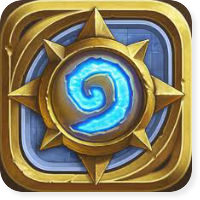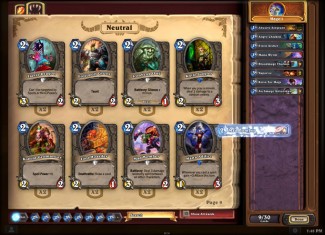Bastion
LQ: 9.15
Recommended Age: 10+
Skills Used: Planning, Working Memory, Mathematics, Reading

Card games themed around a gaming series or franchise usually fall into two camps: too simple or too complex. Hearthstone: Heroes of Warcaft is neither. It’s a digital strategy game developed by Blizzard, the creators of World of Warcraft and Diablo, in which players fight opponents using spell and minion cards. Spell cards usually provide either unique powers or unbalanced attack-heavy plays, while minion cards tend to create defense, tactics, and combos, ultimately allowing players a balanced attack. Hearthstone features hundreds of cards and both single and multiplayer styles of play. The rules are easy to understand, as most cards are self-explanatory. The app is free to play against the AI, however, when players engage in Arena (online) mode, they will inevitably wind up purchasing packs of cards, costing roughly $1.50 each. Unlike most card games, Hearthstone imposes a strict no trading policy. Mages, Warlocks, Druids, are among the 9 types fantasy characters which player build their deck around We recommend Hearthstone: Heroes of Warcraft to players 5 and up.
Teachers: check out the classroom guide!
THIS GAME IS GOOD FOR KIDS WHO NEED HELP WITH:
Planning
 It’s difficult for players to formulate a plan of attack before they have their cards. However, there are some things players should always keep in mind. Each hero has a particular set of strengths. For example, a warrior hero has a special ability that does three damage to an enemy hero while a mage's special power does only 1 damage. Because of this disparity, mage cards offer tactics that try to keep players from being overwhelmed by a warrior. Gameplay works like this: each hero has 30 health and 30 cards. Mana crystals, which power attacks, are supplied each turn and grow in number as turn based play develops.
It’s difficult for players to formulate a plan of attack before they have their cards. However, there are some things players should always keep in mind. Each hero has a particular set of strengths. For example, a warrior hero has a special ability that does three damage to an enemy hero while a mage's special power does only 1 damage. Because of this disparity, mage cards offer tactics that try to keep players from being overwhelmed by a warrior. Gameplay works like this: each hero has 30 health and 30 cards. Mana crystals, which power attacks, are supplied each turn and grow in number as turn based play develops.
To plan an attack, players must take into account amount of mana crystals they have available, the type of cards in their deck, the number of enemy minions on the board and their powers, as well as the health of the enemy hero. These are quite a few considerations, especially when players have to make a “best” move as there are many options. Depending on the strengths of the opponent, there are times where it’s better to “wipe the board” of minion cards than deal damage to a hero. Remember, each time an opponent plays a card, it remains on the table until it is defeated. A red number on the card corresponds to health and the green number to power. If a player’s minion card has a higher power than an opponent’s health, then the card with the higher power will win. At first it may seem like simple tactics, but Hearthstone incorporates the planning thinking skill into simple tactical play to test players mastery and gamesmanship.
Flexibility
 It’s important that players adjust their attack style to the type of Hero they are fighting. Even during a battle, players may have to play a different card than they intended to match the power of an opponent’s move. This is where we will see the flexibility thinking skill at work. If players find themselves facing a “taunt” card, they will have to eliminate the that card before attacking the enemy hero. Of course, if a player has a special card that could bypass the taunt to attack the hero directly, that’s the card that should be played. Healing cards can also thwart a strategy, as they add health to a player’s hero. The card that could have finished off the Hero, might just have to wait another turn. These are examples of flexible responses to certain in-game scenarios. Flexible players who tweak their strategy and are good reactionary players will do well in Hearthstone. However, there are time where it’s impossible to defeat an opponent whose deck is just too strong.
It’s important that players adjust their attack style to the type of Hero they are fighting. Even during a battle, players may have to play a different card than they intended to match the power of an opponent’s move. This is where we will see the flexibility thinking skill at work. If players find themselves facing a “taunt” card, they will have to eliminate the that card before attacking the enemy hero. Of course, if a player has a special card that could bypass the taunt to attack the hero directly, that’s the card that should be played. Healing cards can also thwart a strategy, as they add health to a player’s hero. The card that could have finished off the Hero, might just have to wait another turn. These are examples of flexible responses to certain in-game scenarios. Flexible players who tweak their strategy and are good reactionary players will do well in Hearthstone. However, there are time where it’s impossible to defeat an opponent whose deck is just too strong.
We recommend that players customize their own 30 card decks. Once they have a few quests under their belts, players will start to unlock stronger cards. Experiment with different sets of decks until one proves dominant. Maybe one deck will be more defensive, with a few taunt card. Perhaps another deck would be strictly magic, or hero-specific cards. Try out a few different alternatives to really test the flexibility thinking skill.
All membership plans come with full access to our entire suite of tools learning guides, and resources. Here are a few of the ones we think you’ll like the most: